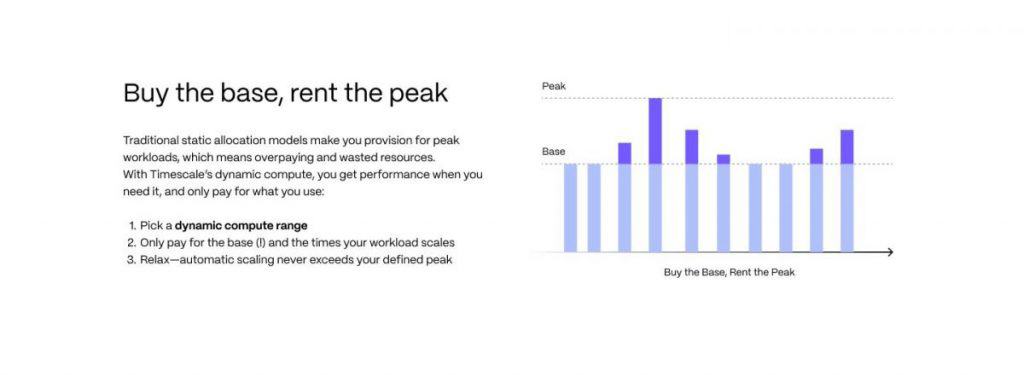[ad_1]

In Brief
Timescale launched Dynamic PostgreSQL for optimizing database compute and storage workloads in business applications.

Cloud database company Timescale announced the launch of Dynamic PostgreSQL, a solution aimed at optimizing database compute and storage resources for analytics workloads within business applications. According to the company, the product offers an alternative approach to managed database services — by enabling users to streamline their expenses, provisioning and performance without compromising operational efficiency.
Timescale said that the release of Dynamic PostgreSQL marks a departure from the prevalent trend in the industry, where specialized databases are increasingly sought after for handling unique workloads. The company claims its approach stands out by building upon PostgreSQL, a widely embraced database system.
The latest offering has been tailored specifically for relational workloads. Unlike conventional managed database services that rely on static resource allocation, Dynamic PostgreSQL enables businesses to pay only for the actual compute and storage resources utilized. This approach contrasts with the common practice of paying for resources allocated at peak demand, offering users the flexibility to select a minimum and maximum CPU range.
“Dynamic PostgreSQL aims to provide users best of both worlds— the performance they need, without overpaying for wasted resources. Our offerings dynamic compute and usage-based storage allow customers pick a min/max compute range and we dynamically scale them up and down within this range, based on their immediate workload. At the end of the month, they only pay for the base compute (minimum of the range) plus any incremental compute,” Mike Freedman, CTO and co-founder of Timescale told Metaverse Post. “Rather than allocating disk space you don’t use, you only pay for the data you actually store.”
The announcement follows Timescale’s recent implementation of usage-based storage within their time-series cloud product. The company claims that the feature eliminates the need for customers to forecast storage allocation, ensuring they only pay for the storage they use, resulting in an average cost savings of 35% for existing customers in the initial month.
Enhanced Computing Capabilities for Data Infrastructures
Timescale said that Dynamic PostgreSQL for relational workloads encompasses a usage-based storage model with added dynamic compute capabilities. This allows customers to select a CPU range while only paying for the actual usage, allowing cost predictability without compromising system performance.
“Serverless databases are often hosted on highly oversubscribed infrastructure, and they are often architected and optimized to spin up/down to zero. This leads to bad “cold boot” query performance as data needs to be paged in from remote storage, and “noisy neighbor” problems when the database competes for resources with other colocated tenants with inadequate isolation,” explained Timescale’s Freedman. “Our dynamic compute scales up nearly instantaneously, and users aren’t penalized for scaling with out-of-control costs. They don’t take the big performance hit by an architecture optimized for intermittent workloads. Instead, they just pay for the compute they use, while ensuring strong baseline performance.”

Freedman said that the new offering can flexibly scale up to additional compute resources within the provided range, depending on their load. Dynamic PostgreSQL’s architecture allocates kernel cycles via low-level operating system interfaces, across its cloud-native infrastructure.
“This is very different from serverless products that autoscale or migrate instances under the covers, which promise this huge range of flexibility but fall far short,” Timescale’s Freedman told Metaverse Post. “Dynamic PostgreSQL was intentionally designed and engineered to avoid these issues. We originally built TimescaleDB on PostgreSQL because we believe PostgreSQL is the best foundation to build powerful applications, and this still holds true.”
The company announced that Timescale Dynamic PostgreSQL product is readily available for access and interested parties can schedule a demo using this link.
Disclaimer
Any data, text, or other content on this page is provided as general market information and not as investment advice. Past performance is not necessarily an indicator of future results.
![]()
![]()
The Trust Project is a worldwide group of news organizations working to establish transparency standards.
Victor is a Managing Tech Editor/Writer at Metaverse Post and covers artificial intelligence, crypto, data science, metaverse and cybersecurity within the enterprise realm. He boasts half a decade of media and AI experience working at well-known media outlets such as VentureBeat, DatatechVibe and Analytics India Magazine. Being a Media Mentor at prestigious universities including the Oxford and USC and with a Master’s degree in data science and analytics, Victor is deeply committed to staying abreast of emerging trends.
He offers readers the latest and most insightful narratives from the Tech and Web3 landscape.

Victor Dey

Victor is a Managing Tech Editor/Writer at Metaverse Post and covers artificial intelligence, crypto, data science, metaverse and cybersecurity within the enterprise realm. He boasts half a decade of media and AI experience working at well-known media outlets such as VentureBeat, DatatechVibe and Analytics India Magazine. Being a Media Mentor at prestigious universities including the Oxford and USC and with a Master’s degree in data science and analytics, Victor is deeply committed to staying abreast of emerging trends.
He offers readers the latest and most insightful narratives from the Tech and Web3 landscape.
[ad_2]
Read More: mpost.io










 Bitcoin
Bitcoin  Ethereum
Ethereum  Tether
Tether  XRP
XRP  Solana
Solana  USDC
USDC  TRON
TRON  Dogecoin
Dogecoin  Lido Staked Ether
Lido Staked Ether  Cardano
Cardano  Wrapped Bitcoin
Wrapped Bitcoin  Hyperliquid
Hyperliquid  Wrapped stETH
Wrapped stETH  Sui
Sui  Bitcoin Cash
Bitcoin Cash  LEO Token
LEO Token  Chainlink
Chainlink  Stellar
Stellar  Avalanche
Avalanche  Toncoin
Toncoin  USDS
USDS  WhiteBIT Coin
WhiteBIT Coin  Shiba Inu
Shiba Inu  WETH
WETH  Wrapped eETH
Wrapped eETH  Litecoin
Litecoin  Binance Bridged USDT (BNB Smart Chain)
Binance Bridged USDT (BNB Smart Chain)  Hedera
Hedera  Ethena USDe
Ethena USDe  Monero
Monero  Polkadot
Polkadot  Bitget Token
Bitget Token  Coinbase Wrapped BTC
Coinbase Wrapped BTC  Uniswap
Uniswap  Pepe
Pepe  Pi Network
Pi Network  Aave
Aave  Dai
Dai  Ethena Staked USDe
Ethena Staked USDe  Bittensor
Bittensor  OKB
OKB  BlackRock USD Institutional Digital Liquidity Fund
BlackRock USD Institutional Digital Liquidity Fund  Aptos
Aptos  Internet Computer
Internet Computer  Cronos
Cronos  NEAR Protocol
NEAR Protocol  Jito Staked SOL
Jito Staked SOL  sUSDS
sUSDS  Ethereum Classic
Ethereum Classic